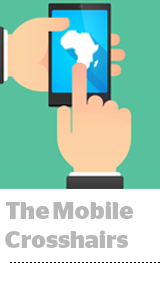 African mobile network Econet Wireless will pre-install Shine’s ad-blocking tech for 40 million subscribers across Zimbabwe, South Africa, Burundi and Lesotho.
African mobile network Econet Wireless will pre-install Shine’s ad-blocking tech for 40 million subscribers across Zimbabwe, South Africa, Burundi and Lesotho.
The deal, revealed Thursday, represents the Israeli startup’s third public telco partner and its second full integration.
Although Econet will pre-install Shine’s network-level ad-blocking technology for all of its subscribers, government regulations require Econet provide a choice to opt in or out of Shine’s ad blocking. It’s the same model Shine used last year with the Caribbean telco Digicel, its first partner, where “a couple of hundred” members have opted in to the program, according to Shine CMO Roi Carthy.
While Shine’s network-level ad blocking theoretically is a more serious threat than app- and browser-based ad blocking, according to sources with knowledge of Google’s and the IAB’s counter-ad-blocking strategies, the ad industry isn’t concerned about Shine because it has few users.
The IAB and Google had each considered studying the in-market effects of Digicel’s Shine activation before concluding the research costs would outweigh any potential revenue losses.
But business developments take longer in the telco world, said Carthy.
Shine’s sales cycles are between one to two years, as opposed to “the lightning speed of internet deals and integrations,” he said.
There’s extensive vetting before a carrier allows Shine to install its data packet inspection machine on the carrier’s infrastructure, which allows it to detect and block ads in either browsers or apps.
Carthy said Shine has developed a unique degree of trust with its telco partners. It helps that a major Shine investor, Li Ka-shing of Hong Kong, also owns the European mobile network Three, which is one of Shine’s partners.
And mobile carriers appreciate Shine’s vocal opposition to the advertising and media giants that profit by pushing marketing messages while the telcos face customers angry about data overage charges.
When Digicel chairman and owner Denis O’Brien launched the Shine partnership, he said businesses such as Google, Facebook and Yahoo should bear more mobile network operational costs.
Shine’s deal with a mid-tier African carrier group underscores the fact that it has struggled to gain adoption in global markets and is boxed out of the US due to net neutrality laws. But these chunks add up, said Carthy.
“In emerging markets the value proposition and need for this service is going to be different,” he said, since the cost of mobile data is more significant to consumers.
Econet Zimbabwe CEO Douglas Mboweni said in a release that Econet’s deal with Shine will help alleviate “bill shock resulting from unsolicited adverts,” and that consumers won’t be tracked and profiled by ad tech platforms.
Up to 40% of an Econet subscriber’s data plan comes from ads, said Carthy, and the telco pays Shine an unknown percentage of the money it saves in data charges and system maintenance.
Eventually, Shine would like to have a set of opted-in users across its global partner network large enough to leverage a revenue stream from digital platforms, similar to what Adblock Plus has through its Acceptable Ads whitelist.
“To come to the blunt point, ad blocking is not the destination,” said Carthy. “It’s a valuable service, and a necessary station along the way, but the idea is to create a new value proposition where the user isn’t abused by ad tech and the advertiser isn’t paying for fraud or unviewable ads.”












